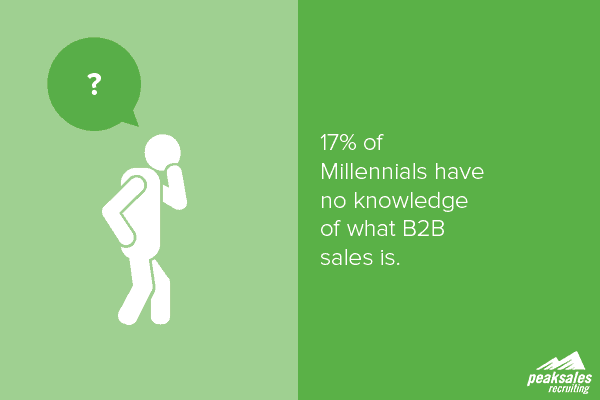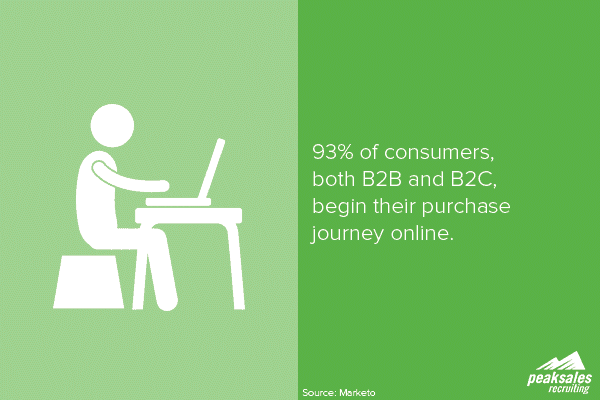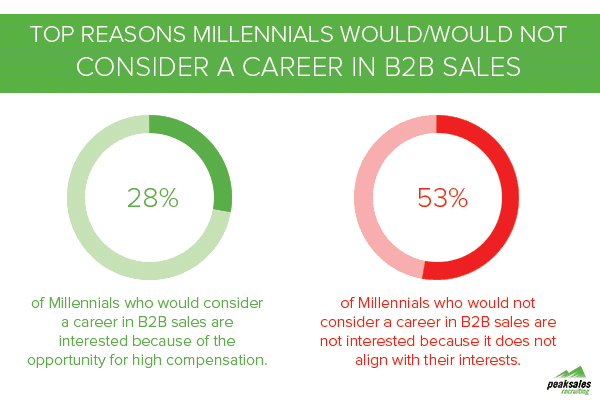A breakdown of the B2B sales career: why it’s lucrative, what makes stand out salespeople, and the assets required to excel.
This article will break down exactly what B2B sales looks like today and explain why it’s a mistake to pass over a sales career as a lucrative profession for a generation that cares more about lifestyle and meaningful work than money alone.

With companies planning to expand their sales forces over the next several years and a large number of unemployed or underemployed Millennials, we examine exactly what comprises this type of career, and why you, as a Millennial, should care.
What is B2B Sales?
In its most basic form, business-to-business (B2B) sales is the process of selling that occurs between two businesses. It usually comprises of selling a supply, product, or solution. While at a basic level all salespeople serve the same functions, there are significant differences in the skills and competencies required of each. For example, a software solutions company might sell website analytics performance solutions; another B2B company might sell the digital marketing software to a business to execute their online marketing campaigns. While all great salespeople are driven, persistent, and work with a sense of urgency, B2B selling involves sales cycles that are longer and more complex, and include multiple buyers and stakeholders.
Like almost every aspect of business, the tech revolution has drastically changed the w
Required Assets
The most basic qualifications required by a B2B salesperson includes the ability to communicate effectively, build relationships, perform research, listen actively, and present solutions. These are considered entry level skills for a sales position and are the first skills looked for by employers. While such skills are necessary, any qualified person entering the workforce should possess them.
In addition to these baseline abilities, top performing B2B salespeople possess:
- Extensive product and domain knowledge. B2B consumers expect B2B salespeople to offer market and product insight and educate them when they are considering the purchase of a product or solution.
- Strong presentation capabilities that can portray complex sets of data and product/market analysis in a clear and concise way.
- An ability to negotiate purchase terms among multiple stakeholders throughout the sales cycle.
As the authors of Insight Selling explain, great B2B sellers are able to connect with buyers based on their company needs, but also with buyers as people. They have the ability to persuade the customer that any risks required of the purchase will lead to a substantial RIO, and engage with the needs of the buyer by consulting and collaborating throughout the purchase process. And this is simply where it begins.
As more and more universities</span are offering sales related courses and certifications, young people entering the workforce are able to enter a sales career with some formal education in sales as a discipline. For example, a teaching innovation by a small Midwest university became the subject of an academic study when it initiated an experiential B2B sales course for its undergraduate students. The course taught students how to design cover letters, pitch letters and emails, and draft proposal memos, among other things.
The course further endeavoured to mitigate some of the common misperceptions of sales representatives, such as the use of high-pressure selling tactics and unhealthily competitive work environments. The activities involved in the course functioned to introduce students to the idea that being a sales representative requires effort and dedication similar to other professional occupations, such as a teacher, lawyer, or doctor. While selling capability may in part be something you are born with, there are significant ways you can develop and hone an innate set of qualities, much like other/identifying-sales-hunter-dna-5-interviewing-secrets/ career paths.
Number One Key to Success
When it comes to the actual DNA (the characteristics or qualities that make a person naturally attuned to sales success) of a salesperson, it’s possible to overlook a career in sales if you don’t view yourself as the ultra confident, highly extraverted type. However, new research is now available that should quell such fears: a study conducted by Murray Barrick, published in the Journal of Applied Psychology, found that conscientiousness, not extraversion, is the personality trait most associated with success as a sales representative.
Sales representatives high in conscientiousness are more likely to set goals and are more likely to be committed to goals, which in turn is associated with greater sales volume and higher supervisor ratings of job performance.
There are two facets of conscientiousness that are important for B2B salespeople to understand to be successful: can-do and will-do performance. The biggest predictors of can-do performance are “ability, declarative knowledge, procedural knowledge, and skills” according to the study. Conversely, will-do performance is most strongly correlated to measures of “personality, interests, and reward preference.” Simply put, salespeople possess exceptional traits of drive. This asset leads to higher levels of resiliency, optimism, and need to achieve, all of which are necessary factors to exceptional sales performance.
For those less extraverted who are in or interested in B2B sales, this means that high compensation and career success are not only possible, but actually probable with the right amount of conscientiousness. Extraversion, often posited as a necessary ingredient for sales success, in fact has low correlation to a thriving career in sales. This opens the door to those who may be quieter in volume but who are exceptionally hard working and effective strategists.
What’s In it for Me?
Every career comes with its own set of pitfalls and perks; sales is no different. From work-life flexibility and autonomy to the ability to operate as an entrepreneur to high compensation potential, there are many aspects of a sales career that make it appealing to the right person. In fact, data from the respondents of Peak’s Millennials survey suggests that most individuals (28%) who stated they were interested in B2B sales was because of the opportunity for high compensation. On the other hand, 53% who stated they had no interest in B2B sales did so because this career path did not align with their interests. Specifically, they stated they were interested in a career in the tech or professional services sectors.
Moreover, Millennials that indicated their interest in a B2B sales career stated they were interested in a career in the tech or professional services sectors. Interestingly, both the tech and professional services sectors have identified a need for salespeople, and the consequences have been felt by organizations of all sizes due to this shortage in the workforce. In fact, the Harvard Business School’s U.S. C
Despite Millennials’ reputation as digital natives, a report published by the IBM Institute for Business Value corroborates with Peak’s own data. The data demonstrates that this generation actually prefers more direct interaction with vendors when it comes to B2B buying and selling. Past generations of B2B buyers have relied most heavily on third party articles, reviews, and expert analysis when considering the purchase of a product. Today, however, Millennials are most likely to trust the vendor’s representatives when researching a product. They want communication throughout the sales cycle, and interaction as often as possible.
As the generation who experienced the ramifications of a financial crisis, Millennials are looking to develop security monetarily, and have naturally shifted away from the seemingly risky and hard driving lifestyle of a salesperson. But, companies are beginning to respond to Millennials’ perception of sales, and it is more common now to offer a higher base compensation as a way to alleviate the stress that can come with a commission based career. Additionally, sales isn’t always about being a hunter for new business, you can always farm existing accounts, which means you don’t necessarily have to be hyper aggressive to have success. Sales today is less about being a showy salesman with a silver tongue and more about being a problem solver with people skills.
If you are an exceptional or up and coming B2B salesperson with an interest in exploring exceptional career opportunities in your sector, or simply want to gain knowledge of what’s happening in your industry, submit your resume to our Candidate page here.
relpost-thumb-wrapper
close relpost-thumb-wrapper
Latest posts by Eliot Burdett (see all)
- 31 Must-Know Sales Follow-Up Statistics for 2024 Success – December 21, 2023
- 7 Success Characteristics That Define Top Performers – December 19, 2023
- 5 Reasons Your Top Employees Quit (Stop Doing This to Stop Them Leaving) – December 14, 2023





